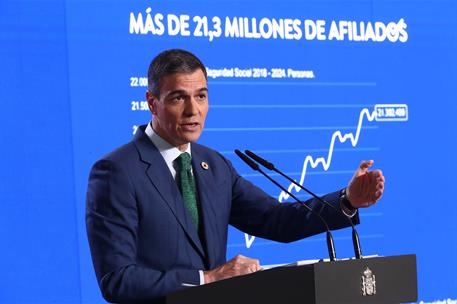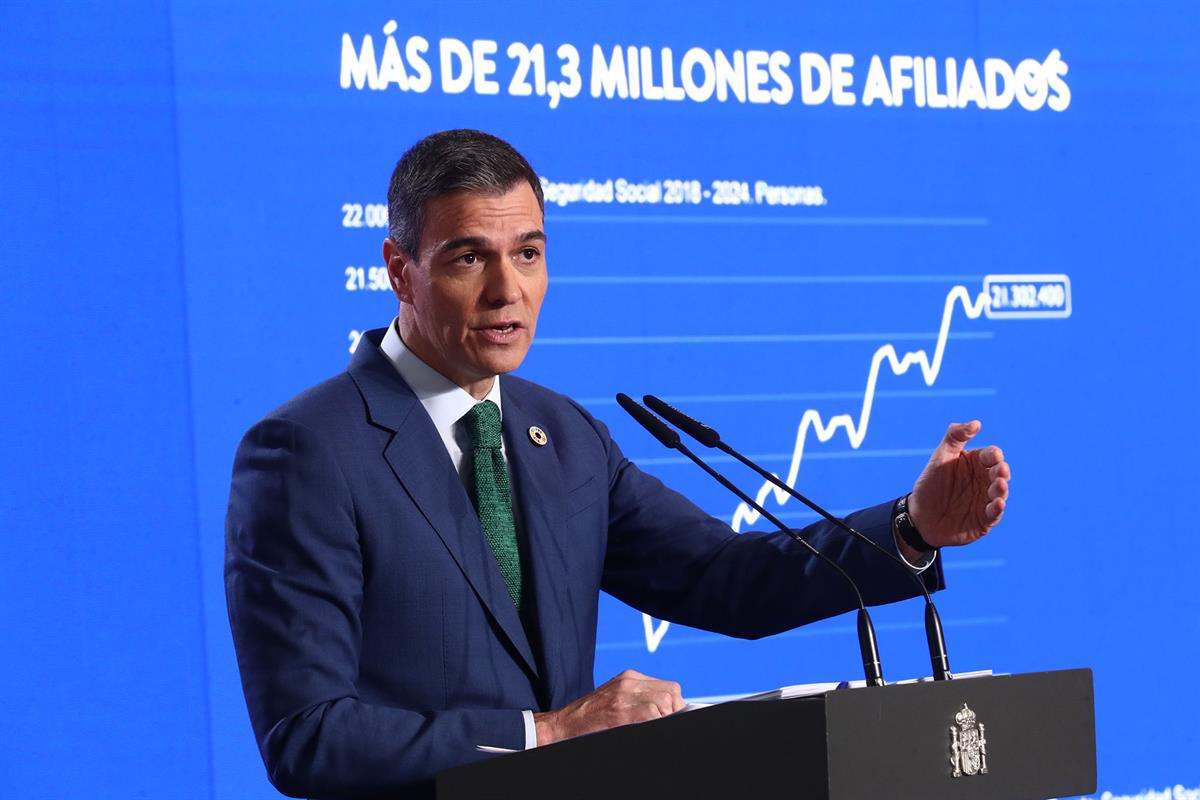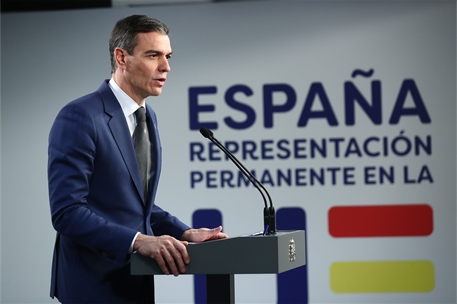Assessment of the political year
Pedro Sánchez: "Spain is a better country today than it was six years ago, and in 2027 it will be even better than it is today"
President's News - 2024.12.23
The President of the Government of Spain, Pedro Sánchez, during his appearance after the Council of Ministers | Pool Moncloa/Fernando Calvo y Pool UE. 2024.12.23
-
The President of the Government of Spain, Pedro Sánchez, during his appearance...
-
The President of the Government of Spain, Pedro Sánchez, with the latest edition...
-
The President of the Government of Spain, Pedro Sánchez, during his appearance...
-
 The President of the Government of Spain, Pedro Sánchez, during his appearance...
The President of the Government of Spain, Pedro Sánchez, during his appearance...
Moncloa Palace, Madrid
The President of the Government of Spain, Pedro Sánchez, has stressed that "Spain is a better country today than it was six years ago, and in 2027 it will be better than it is today." He said this during an appearance at Moncloa Palace to assess the political year, in which he pointed out that despite "the noise, the obstacles, the false news, and the disloyalty of some, Spain is making progress," as the figures show, "thanks to the work of citizens, companies and public administrations. And thanks to the public policies that the Government has promoted since 2018."
In this sense, Pedro Sánchez pledged to "continue working so that in 2027, when the legislature ends, Spain will be a richer, more sustainable, fairer and more influential country than it is today" and has asked that "we do not fall into the fatalism that paralyses" or into "unjustified and self-interested pessimism." "Today we are not talking about a Spain in crisis, we are talking about a Spain that leads. Nobody talks about Spain breaking, they talk about the records we break. This is the brand Spain that we export and of which we can be proud," he added.
During his appearance, the head of the Executive made an assessment of the political year, in which the Government has approved 25 laws, and has taken the opportunity to present a new edition of 'Cumpliendo', the Spanish Government's accountability report, designed with the help of experts, which examines the progress made on the 197 commitments acquired for this legislature.
Spain, one of the most promising western economies in 2025
On economic matters, he welcomed the "very positive" figures for the last 12 months, as Spain is now the fastest growing country among the world's main economies, tripling the growth rate of the EU and surpassing the expectations of international and national organisations. The year-on-year GDP growth figure of 3.3% recorded in the fourth quarter, published today by the National Statistics Institute, allows us to "look forward to the beginning of 2025 as one of the most promising economies in the West," he said.
One of the factors behind Spain's economic "success" is the "transformative stimulus" of the NextGenerationEU funds from the Recovery Plan. Spain was the first member state to implement it. To date, of the 79.854 billion euros allocated, more than 44.163 billion euros have already been resolved, which have gone to the 17 autonomous communities and 839,419 public administrations, households and companies, among which almost half are SMEs.
In this respect, he stressed that "growth is sustainable for the planet and for public accounts." The public deficit will stand at 1.8% at the end of the legislature, bringing forward the pace of public debt reduction by two years.
Another factor behind the "economic success" is the increase in export activity, which in the last six years has risen by 40% and which in 2024 enabled Spain to overtake Germany as Europe's leading export economy. "Our companies have more and more presence, more business and more prestige abroad," with the growing confidence of foreign markets and investors in Spain, he said. Foreign direct investment is 16% higher than before the pandemic and Spain has become the destination of multi-million dollar strategic investments, such as the more than 4 billion euros that will be spent by Stellantis and CATL to build their gigafactory of electric batteries in Zaragoza, as well as the Artificial Intelligence factory that the European High Performance Computing Company will set up in Barcelona.
As the president of the Government of Spain explained, the good performance of the macro-economy is translating into an increase in household purchasing power of 3.1% in the first half of the year compared to the previous year, and is already 6% higher than before the COVID crisis; consumption is increasing. Despite the difficult international context, Spain has created 400,000 new jobs, more than Germany and Italy put together, with 21.3 million national insurance contributors and, for the first time, this includes more than 10 million women.
The President of the Government of Spain, Pedro Sánchez, with the latest edition of the Cumpliendo report | Pool Moncloa/Fernando Calvo
New 2.8% rise in contributory pensions and reduction in inequality
With regard to the second priority of the legislature, the strengthening of the welfare state with better public services, Pedro Sánchez announced that the Council of Ministers has approved a new increase in pensions, which will be 2.8% for contributory pensions. This new increase will take place after the average retirement pension has risen this year by 734 euros per year, the Minimum Salary has been increased and the income from the Minimum Basic Income to protect the purchasing power of the elderly and workers.
"It is essential that the wealth generated by the economy reaches all citizens," said the president, who specified that pensions will improve for 12 million citizens. In addition, he welcomed the fact that Spain is one of the countries that is managing to reduce inequality the most by registering a distribution of income, measured by the Gini coefficient, which is 1.5 points more equal than in 2018. In the last six years, disposable income in real terms of the average Spanish household has grown by 9%. "We must continue to move in the direction of these years. That is why we must continue to strengthen the welfare state and improve workers' wages," he added.
Strengthening the welfare state: Health, Education and Culture
Pedro Sánchez also explained that in the last year the number of healthcare staff and the number of places for medical students in public universities increased once again, and a record number of places for specialised healthcare training have been offered, with more than 11,900. In addition, the National Health System's treatment portfolio has been expanded with new advanced therapies, the speciality of Emergencies has been approved, and 2 billion euros has been invested in cutting-edge health companies and research, which will create 12,000 new jobs.
In education, the state has again increased public investment, raising the enrolment rate for children aged 0-2 and allocating almost 2.6 billion for scholarships, a record high that is 65% higher than in 2018. In Vocational Training, 56,000 new public places have been created, 16 new qualifications have been launched, 4 new hubs with leading companies have been set up and achieved the "milestone" that in the 2024-25 academic year, all the new courses in intermediate and higher vocational training cycles will be dual training. In the university sector, more than 170 million euros has been allocated to train more than 2,200 new lecturers, and a historic agreement has been signed with the regional governments to increase the number of staff and consolidate the positions of 5,600 teachers. In addition, grants have been increased and the largest investment in science in the history of Spain has been approved, which will be almost 18.4 billion euros between now and 2027.
Extension until June of public transport subsidies
Regarding the priority of further deploying environmental adaptation and mitigation policies, he pointed out that our country has increased its renewable energy generation by 13% in 2024 and already produces almost six times more megawatts with solar PV than in 2018, has reduced water consumption and the use of solid fossil fuels, and has put almost 2 million hybrid or electric cars on the road. The use of public transport increased by 13%, thanks to improvements in the service and a firm commitment to discounts and free travel for certain routes and segments of the population.
Pedro Sánchez announced that the Council of Ministers has approved the extension of these public transport subsidies for a further six months, until June 2025, which will be followed by a broad package of discounts and aid for passengers. The head of the Executive highlighted that Spain is already the second country in the world in terms of kilometres of high-speed railway, more than Germany and Italy combined, and in the last six years it has managed to reduce its greenhouse gas emissions by 19%.
The President of the Government of Spain, Pedro Sánchez, during his appearance after the Council of Ministers | Pool Moncloa/Fernando Calvo
Territorial cohesion and foreign policy
In terms of coexistence and territorial cohesion, Sánchez stressed that "this government is achieving a level of cooperation and understanding with the regional and municipal administrations that has not been seen for a long time." He recalled that meetings have been held with practically all the presidents of the autonomous regions, autonomous cities and with the Spanish Federation of Municipalities and Provinces. A new Conference of Presidents was held and more than 1,000 new cooperation agreements have been signed between the General State Administration and the communities, in addition to the 5,100 signed during the previous legislature.
A co-governance effort that "is paying off" as, in 2024, economic relations between communities grew again, increasing 24% since 2018. Labour mobility between territories increased 54% and transfers from the central government to the autonomous governments rose 15%, while conflict between them decreased notably.
As a fifth priority for this legislature, the president has set "deploying an ambitious and effective foreign policy based on openness, increasing our allies, and defending multilateralism and peace everywhere, in Ukraine, Palestine or the Maghreb." He also remarked that "our country enjoys greater international influence and prestige every day" and recalled that Spain holds the first executive vice-presidency of the European Commission.
DANA Aid
The head of the Executive also referred to the commitment acquired by the Government to help the territories affected by the DANA "by providing all the necessary resources, for as long as necessary." Specifically, he pointed out that the aid made available by the state amounts to a potential 16.6 billion euros. A total of 57,457 applications have already been processed and more than 690 million euros has already been transferred to hundreds of companies and some 50,000 people.
On the other hand, he explained that the work of the almost 20,000 military, police, civil guards, infrastructure technicians, forestry and other state professionals deployed in the damaged areas, who continue to work, has allowed for more than 37,000 rescues, the recovery of more than 450 kilometres of roads and railways, and the restoration of half a million telephone and electricity connections that were interrupted by the DANA. These troops are now focused on supporting other tasks, such as draining garages, rebuilding infrastructure and processing aid.
Marisa Paredes, Grand Cross of Isabel La Católica
Finally, Sánchez announced that today's Council of Ministers approved the posthumous award of the Grand Cross of Isabel La Católica to the exceptional actress, Marisa Paredes, and the award of 37 medals of Fine Arts to actresses, musicians and writers such as Carmen Machi, Robe Iniesta and Elvira Lindo, among others, "artists who make our country and, above all, our lives great," said the president of the Government of Spain.
Non official translation








